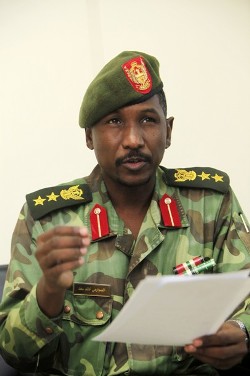Sudan’s president declares emergency in Blue Nile, sacks governor
September 2, 2011 (KHARTOUM) – The Sudanese president Omer Hassan al-Bashir has declared a state of emergency in the Blue Nile State and dismissed its governor Malik Agar amid reports of aerial bombardments and concomitant displacement in the unrest-hit region.

The announcement follows the eruption on late Thursday of clashes in the Blue Nile between SAF and the armed opposition Sudan People’s Liberation Movement North (SPLM-N) which is chaired by Agar who was elected governor of the state in the country’s elections of April 2011.
The warring sides traded accusations over who started the fight. The SPLM-N’s secretary-general Yasir Arman, speaking to Sudan Tribune on Friday, said Sudan’s army instigated the clashes by attacking the SPLM-N’s Joint Integrated Units under the command of Jondi Suliyman as well as the residence of Agar.
Speaking over the phone to Sudan Tribune from an undisclosed location on Friday, Malik Agar chided the Sudanese army for the attack it launched in his state, saying he was in a state of “self-defense.”
In the meantime, Sudan’s army said that SPLM-N forces carried out attacks in Al-Damazin and more than four areas in the vicinity.
According to the army official spokesman Al-Sawarmi Khalid Sa’ad, SPLM-N was mobilising its forces to launch coordinated attacks on a number of army units. He added that the army was able to vanquish the assailing forces.
“What happened was expected and what Agar is doing was nothing but a desperate attempt,” Sa’ad said.
The spokesman further said that SAF had asserted control over the situation and all parts of the state, calling on the state’s youth to hunt down the “rebel” forces of Agar.
In contrast, Agar told Sudan Tribune that the Sudanese army was the one who instigated the fighting by attacking the positions of SPLM-N’s troops and three vehicles carrying a number of SPLM-N military commanders who were leaving Al-Damazin en route to Al-Kurmuk town in the state.
He said that the fighting had lasted for a quarter of an hour before SPLM-N forces withdrew. Agar said that the state in the past period had been under growing tension due to the intensive military deployment of Sudan’s army.
The governor went on to accuse Sudan’s army of carrying out aerial bombardments in an area within Al-Kurmuk town.
Agar pointed out that the SPLM-N had vacated all the positions it held outside the town, adding that they were currently counting the number of lives lost in the attacks.
“If they resort to peace, then welcome, but I am currently defending myself,” he said.
Meanwhile, the clashes had caused waves of displacements in the areas of Sinnar, Wad Alneel and Abu Hajar, according to Sudan Tribune’s sources. The sources said that the eastern parts of Blue Nile were also affected as a great number of citizens fled the clashes and aerial bombardment.
Sudan’s foreign ministry announced that it intends to include the violent events in Al-Damazin to the complaint it lodged to the UN Security Council (UNSC) against the newly established state of South Sudan.
The ministry said it was arranging contact with foreign diplomats and representatives of regional bodies in Khartoum in order to brief them on the situation in Blue Nile.
The Sudanese government this week sent a letter to the UNSC accusing South Sudan of supporting SPLM-N rebels in South Kordofan State which neighbors the Blue Nile.
Both states are part of north Sudan but their population sided largely with the South during the second Sudanese civil war 1983-2005. The SPLM-N, which Khartoum refuses to recognise as a legal political party, was affiliated to the party that rules South Sudan.
Under the 2005 peace deal that ended the north-south war, the two states were supposed to hold “popular consultations” to determine the level of local satisfaction with the implementation of the agreement.
But the vote stalled in both states with South Kordofan descending into violence in early June. The genesis of the ongoing clashes in the two states can be traced back to May’s warning by SAF to SPLM-N to either disarm their forces or deploy to what is now the new country of South Sudan
The SPLA, which is the official army of South Sudan, responded by saying that the units in South Kordofan and Blue Nile are composed of northern soldiers, therefore withdrawing to the South is not an option.
The Blue Nile’s governor told the New York Times (NYT) at the time that SAF has moved “dangerously close” to the bases of SPLA fighters and that he did not think the southern-allied forces would surrender.
(ST)
